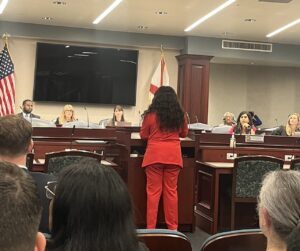
Feeling censored and powerless, various members of Florida A&M University’s National Pan-Hellenic Council, also known as the Divine 9 Greek-lettered organizations, banded together Monday in opposition of House Bill 999.
HB 999 is regarded by many as an addition to Gov. Ron DeSantis’ ongoing effort to control higher education.
This bill dictates what courses college students can pursue by prohibiting courses involving race and gender.
The bill also prohibits government spending on activities that promote diversity, equity and inclusion, and expands the Board of Governors’ appointees’ power by giving those appointed rights in the faculty hiring process and allowing them to review a tenured faculty member at any time.
Regarded as vague and ambiguous by its detractors, the bill has had a chilling effect on students at FAMU.
At the bill’s first committee hearing Monday, Robert Tucker, a fourth-year broadcast journalism major at FAMU and a member of the Upsilon Psi Chapter of Omega Psi Phi fraternity addressed the 17-member committee.
“People of color weren’t always able to associate [themselves] with programs [which predominately serve] other ethnicities, therefore, we found a way to [leave an] impact [on] ourselves, families and communities with these Greek-lettered organizations,” he said. “The National Pan-Hellenic Council was created for people that look like me.”
Though the bill does not explicitly state that these organizations will be affected, the bill does not protect these organizations either. Because many of these organizations promote diversity, equity and inclusion, many fear that passing HB 999 will destroy the sole purpose of their organization’s mission.
Ahmad Kebe, a fourth-year broadcast journalist major at FAMU and a member of the Beta Nu Chapter of Alpha Phi Alpha fraternity, gave a sympathetic testimonial in opposition to the bill during the committee hearing.
“The NPHC serves as a vessel for not only each organization’s mission but the diversity, equity and inclusion that we promote,” Kebe said. “[passing this legislation] will potentially dismantle our organizations, which truly have had an impact on its members, the student body and the community.”
Eight of the nine Greek organizations that make up the Divine 9 were established more than a century ago.
These organizations have had a continuous involvement in the advancement of Blacks and minorities worldwide.
In the 1960s, for example, members of the NPHC were at the center of the fight for civil rights. Several members also held membership in civil rights organizations, such as, the Southern Christian Leadership Conference, the Congress of Racial Equality, the Student Nonviolent Coordinating Committee and the National Association for the Advancement of Colored People.
Destiny Gaines, a fourth-year broadcast journalism major at FAMU and a member of the Beta Alpha Chapter of Delta Sigma Theta Sorority, spoke during Monday’s hearing about the benefits she has acquired from being a part of a D9 organization.
“As a member of the sorority, I have witnessed and participated in the change that we have inflicted on local, national and international communities,” Gaines said.
“The NPHC serves as a pedestal in the community for not only each organization’s mission, but the fact it serves as a sector in the world that will continuously advocate for diversity, equity and inclusion; which is exactly what the House Bill 999 is trying to diminish.”
Although the committee voted 12-5 along party lines to advance HB 999, members of the NPHC are determined to continue to use their voices and social media platforms to advocate against HB 999.